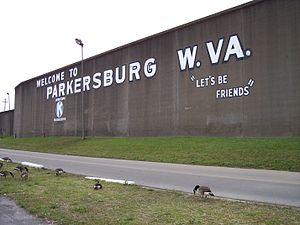 Image via Wikipedia
Image via Wikipedia
The beauty of the book is that while it focuses on the unprecendented career of Garth Brooks, it also chronicles what was going on in the country music world — and the world in general — during the time of his biggest successes.
The Garth Factor brings back a lot of memories. I remember, for example, when the number of Nashville record labels surged from eight to 30. We were all riding the wave that was the country music explosion of the early '90s, much of which was fueled by Garth. (Silly side note: I remember going home to Cleveland, the Rock 'N' Roll Capital of the World, and walking into a store less than a mile from where I grew up and hearing the country station, WGAR, playing on the radio behind the counter. Just a few years earlier, WMMS the legendary rock station, would have been the station of choice in that very establishment. I was both proud and taken aback.)
Here's my one Garth Brooks story. Okay, maybe two. In 1989 I attended the Country Radio Seminar in Nashville for the first time. One night in the Westwood One suite (it was, at the time, the place to go for a free drink) I met Garth, who was with Cassandra Tynes, who worked for independent promoter Tari Laes. They were handing out buttons that said "Much Too Young (To Feel This Damn Old)," which, of course, was the name of his first single. I remember the moment, but it was mostly because I hadn't met anyone named Garth before. Beyond that, I'm not sure if we conversed, or if we did, what we talked about. There was a free bar to get to after all.
A few years later when I was working at industry publication Radio & Records, Garth, who by that time was off to the races in terms of radio and sales success, made an unexpected visit. Alone in the office in the days leading up to Christmas, when Music Row pretty much shuts down, I heard a knock at the front door. When I opened the door, there stood Garth holding Christmas presents. "Hi, I'm Garth," he said. "Ummm, hi, I'm Ken," I replied, not so smoothly. "Hi, Ken. Can you tell me where Tari Laes' office is?" (It was immediately across the street.) "There," I said, pointing in the general direction of her office. "Thanks, Ken."
Here's my one Garth Brooks story. Okay, maybe two. In 1989 I attended the Country Radio Seminar in Nashville for the first time. One night in the Westwood One suite (it was, at the time, the place to go for a free drink) I met Garth, who was with Cassandra Tynes, who worked for independent promoter Tari Laes. They were handing out buttons that said "Much Too Young (To Feel This Damn Old)," which, of course, was the name of his first single. I remember the moment, but it was mostly because I hadn't met anyone named Garth before. Beyond that, I'm not sure if we conversed, or if we did, what we talked about. There was a free bar to get to after all.
A few years later when I was working at industry publication Radio & Records, Garth, who by that time was off to the races in terms of radio and sales success, made an unexpected visit. Alone in the office in the days leading up to Christmas, when Music Row pretty much shuts down, I heard a knock at the front door. When I opened the door, there stood Garth holding Christmas presents. "Hi, I'm Garth," he said. "Ummm, hi, I'm Ken," I replied, not so smoothly. "Hi, Ken. Can you tell me where Tari Laes' office is?" (It was immediately across the street.) "There," I said, pointing in the general direction of her office. "Thanks, Ken."
So there you have it, my two brushes with Garth greatness.
I say all that to say this: I benefited both professionally and personally from country music's '90s boom, much of which was driven by Garth and the industry's attempts to find another Garth. His career has been criticized, analyzed, celebrated, dissected and criticized again, but the bottom line is that Garth Brooks is a rare one of a kind artist who raised the bar in Nashville in particular and the music industry in general.
To find out more read Patsi's book.



![Reblog this post [with Zemanta]](http://img.zemanta.com/reblog_e.png?x-id=4fb3540b-8f00-4477-a94d-566ed3bc25f9)

![Reblog this post [with Zemanta]](http://img.zemanta.com/reblog_e.png?x-id=4ee3472e-ecb2-4bf1-bd97-966a67c5e02c)

![Reblog this post [with Zemanta]](http://img.zemanta.com/reblog_e.png?x-id=c2617318-69c9-48d7-8696-be1e56089518)


